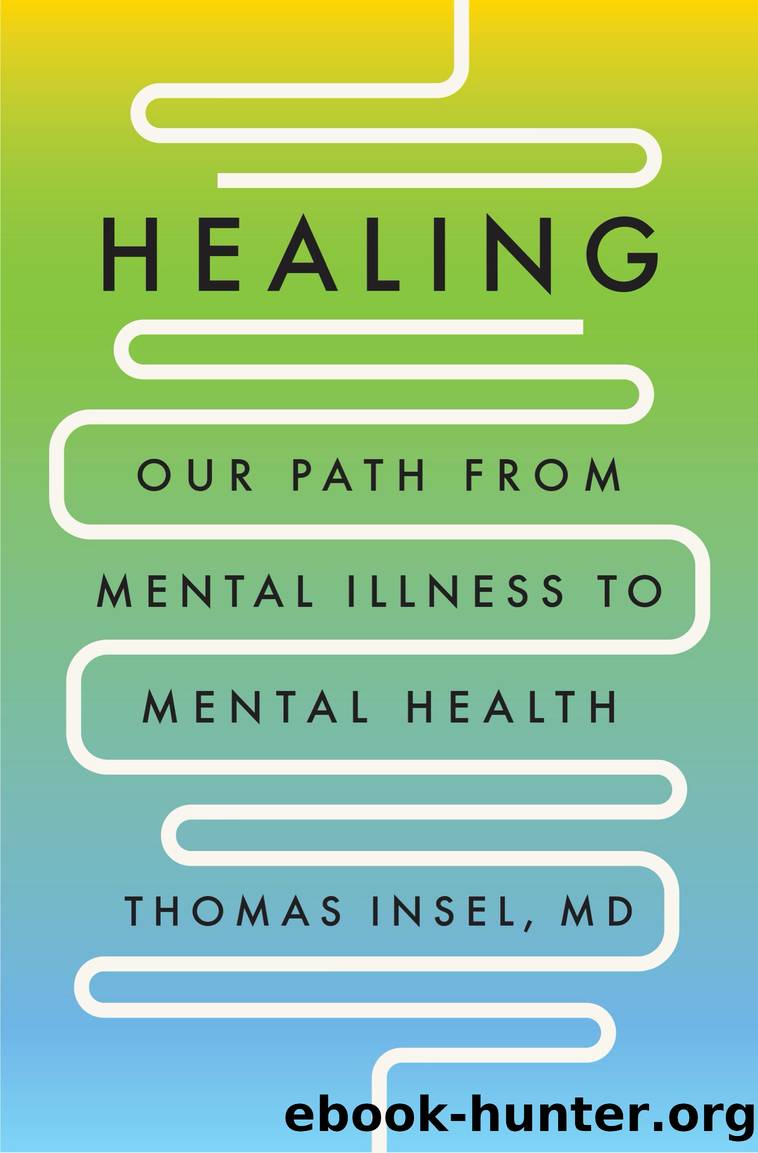Healing by Thomas Insel MD

Author:Thomas Insel, MD [Insel, Thomas]
Language: eng
Format: epub
Publisher: Penguin Publishing Group
Published: 2022-02-15T00:00:00+00:00
Place: Dymphnaâs Gift
Recovery also requires a safe place to live. Carlos was fortunate to have a family that provided ongoing support, including a home where he could slowly rebuild his life. For most people with SMI, family is not an option, either because their illness has destroyed the familyâs trust or because the thought of moving back with family feels threatening or overwhelming. Supportive housing is an effective approach to ensuring a safe place, combining housing with a range of servicesâpsychological support, life-skills training, case managementâfor independent living. The power of this approach really hit me visiting a new mixed-use complex in Claremont, California, where people with SMI live adjacent to individuals and families with no idea of the challenges their neighbors have faced. Dorothy, a sixty-year-old grandmother who was in recovery from twenty years of addiction and homelessness, was telling me that her new apartment meant only one thing to her: âDignity.â As she showed me around her sparsely furnished living room, she began to sob. âAll I wanted. All I lived for was to have my own place where my grandchildren could come for lunch,â she said with tears streaming down her face. âNow that I have that place, I have something to live for.â
Supportive housing, the importance of having a safe, nurturing home, is not a new idea. In the Belgian town of Gheel, citizens have been doing a version of supportive housing for at least five hundred years. The origin legend of Gheel says it all. Dymphna was born in the seventh century to Damon, a pagan king in Ireland, and a Christian mother. Following her mother, Dymphna took a Christian vow of chastity at a young age. When her mother died, her pagan father vowed to take Dymphna as his wife. Dymphna fled to the tiny town of Gheel, near Antwerp, for safety. Soon, however, Damon tracked her down and, in a delusional rage, cut off her head.
The Catholic Church canonized Dymphna in 1247, and in the fourteenth century Gheel built a church in her honor. Soon families struggling with children who had mental illness or intellectual deficits began making pilgrimages from across Europe to Dymphnaâs church. Sometimes they would leave behind their affected family member, quickly overwhelming the resources of the church. In the spirit of Dymphna, Gheelâs residents started to welcome those with disabilities into their homes. In contrast to the rest of the Western world, where people with âpossessionâ were killed, shunned, or incarcerated, Gheelâs citizens for hundreds of years have welcomed them as âboardersâ who could help in the fields in exchange for room and meals. Today the Openbaar Psychiatrisch Zorgcentrum (OPZ), the local psychiatric hospital, manages what is essentially an adult foster-care program to ensure safe housing in the community for people who would otherwise be homeless or institutionalized.
When I visited the OPZ on a crisp April day in 2019, a team of nurses explained the process. Today, boarders are less likely to work in the fields, as Gheel has
Download
This site does not store any files on its server. We only index and link to content provided by other sites. Please contact the content providers to delete copyright contents if any and email us, we'll remove relevant links or contents immediately.
Should I Stay or Should I Go? by Ramani Durvasula(7639)
Why We Sleep: Unlocking the Power of Sleep and Dreams by Matthew Walker(6681)
Fear by Osho(4720)
Flow by Mihaly Csikszentmihalyi(4664)
Rising Strong by Brene Brown(4431)
Why We Sleep by Matthew Walker(4417)
The Hacking of the American Mind by Robert H. Lustig(4355)
How to Change Your Mind by Michael Pollan(4338)
Too Much and Not the Mood by Durga Chew-Bose(4319)
Lost Connections by Johann Hari(4160)
He's Just Not That Into You by Greg Behrendt & Liz Tuccillo(3871)
Evolve Your Brain by Joe Dispenza(3650)
The Courage to Be Disliked by Ichiro Kishimi & Fumitake Koga(3468)
Crazy Is My Superpower by A.J. Mendez Brooks(3377)
In Cold Blood by Truman Capote(3362)
Resisting Happiness by Matthew Kelly(3331)
What If This Were Enough? by Heather Havrilesky(3297)
The Book of Human Emotions by Tiffany Watt Smith(3282)
Descartes' Error by Antonio Damasio(3261)
